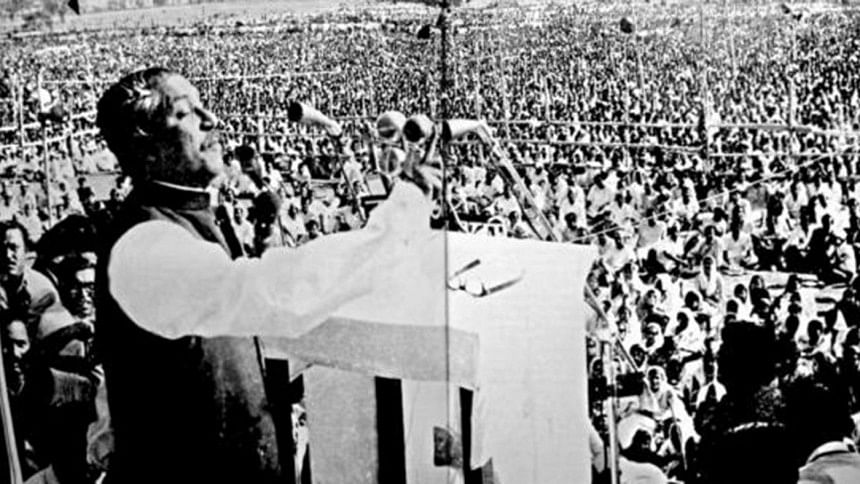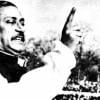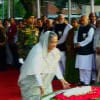Historic 7th March today

"My brothers, I come before you today with a heavy heart."
And so began what would go on to become immortal words which would resonate throughout the annals of history, changing its course forever.
It was the afternoon of March 7 1971, the day when the undisputed leader of the Bangalee nation led the nation across the political Rubicon.
Clad in a white panjabi and pyjama with the characteristic black overcoat, Father of the Nation Bangabandhu Sheikh Mujibur Rahman stepped up to the dais at around 3:15pm. The confluence of people welcomed him with the "Joy Bangla" slogan.
Each carefully thought out word was used to sketch Mujib's guidelines for his people to follow in the developing confrontation with the civil-military-political combine of West Pakistan.
"You know and understand everything. We tried with our lives. But the painful matter is that today, in Dhaka, Chittagong, Khulna, Rajshahi and Rangpur, the streets are dyed red with the blood of our brethrens.
“Today, the people of Bangla want freedom, the people of Bangla want to live, the people of Bangla want their rights.
"With great sadness in my heart, I look back on the past twenty three years of our history and see nothing but a history of the shedding of the blood of the Bangalee people. Ours has been a history of continual sadness, repeated bloodshed and innocent tears.”
In his own imitable and iconic oration, Mujib told a tale of exploitation as million-strong crowd hung on every word.
It was a symphony of a struggle and Bangabandhu was the conductor.
At the mammoth rally at the Race Course ground on March 7, 1971, Mujib called on the freedom-loving Bangalees to fight back against the oppressive Pakistani regime.
And so was signalled the twilight of the struggle for national self-expression and eventual liberation from colonial rule.
In this historic speech, Bangabandhu mentioned the four conditions under which he and the Awami League would attend the National Assembly meeting to be held on March 25 -- the immediate lifting of martial law, the immediate withdrawal of all military personnel to their barracks, the immediate transfer of power to elected representatives of the people, and a proper inquiry into the loss of life during the conflict.
He also gave several directives for a civil disobedience movement -- people should not pay taxes; government servants should take orders only from him; the secretariat, government and semi-government offices and courts in East Pakistan should observe strikes; with necessary exemptions announced from time to time, only local and inter-district telephone lines should function; railways and ports could continue to function, but their workers should not co-operate if they were used to repress the people of East Pakistan.
The speech, now included in Unesco's Memory of the World Register as a “documentary heritage”, encompassed the history of Pakistan preceding the last 23 years.
Bangabandhu spoke in vivid details about the many ways in which the people had been denied their political and economic rights by successive Pakistan governments.
Each word was kissed by fiery passion of a people who had been denied for far too long. Mujib's words pierced the skin of everyone in the audience, exacerbating the scars while simultenously uplifting a passion so rampant.
"If a single bullet is fired upon us henceforth, if the murder of my people does not cease, I call upon you to turn every home into a fortress against their onslaught. Use whatever you can put your hands on to confront this enemy. And for the sake of life, even if I am not around to guide or direct you, continue your movement in a ceaseless manner.”
At this point, the crowd had reached fever pitch. The excitement in the air was palpable, pricking the hairs on the hands of those presenting. Could it be? Had the time come? Would Mujib say the words the nation had longed to hear?
And so it came, without hesitation and an infectious conviction.
“The struggle this time is for emancipation. The struggle this time is for independence.
"Joy Bangla!"
And so it began.

 For all latest news, follow The Daily Star's Google News channel.
For all latest news, follow The Daily Star's Google News channel. 








Comments